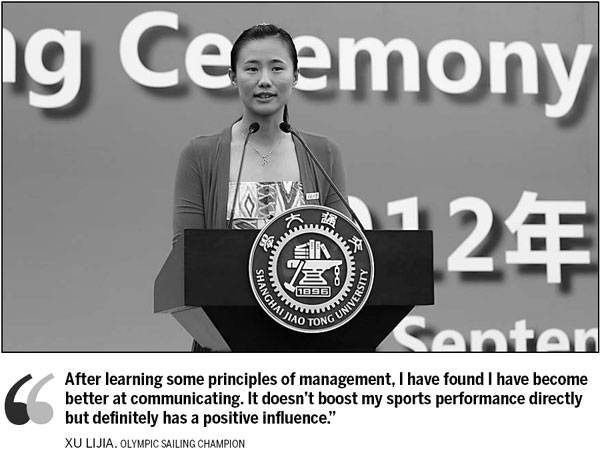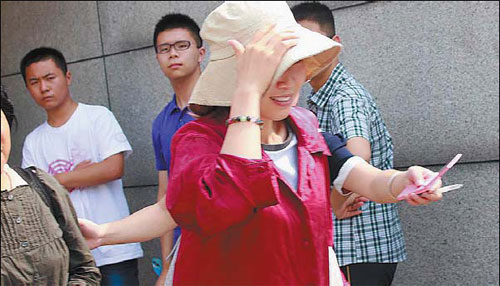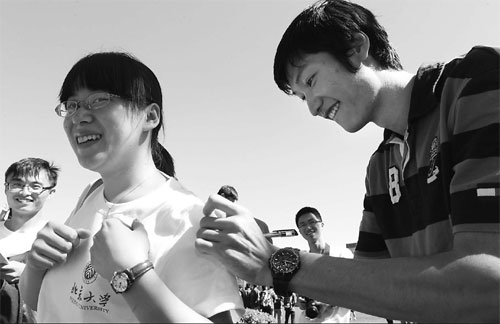OK, so you've won your gold medal - now what comes next?
Updated: 2012-09-26 08:02
By Sun Xiaochen (China Daily)
|
|||||||||
|
Olympic shooting champion Yi Siling is surrounded by fans and students at the opening day of Tsinghua University on Aug 16. Provided to China Daily |
Chinese stars beginning to look beyond sporting glory and to life out of the spotlight, reports Sun Xiaochen.
What do Olympians do after the Games end and the flame goes out? With a four-year hiatus before the next Olympics, some get married, some take long vacations, while many go back to school, trying to make up for all those missed lessons.
After claiming 38 gold medals in London, Chinese Olympians finally have time to rest their bodies and minds and move on to what they have missed over the past few years due to training and competitions.
Returning to college to recharge themselves appears to be the main choice.
"During my preparation for the London Olympics, I was pretty sure that no matter what results I got, I would go back to school right after to finish my studies," Xu Lijia, a gold medalist in the Laser Radial sailing class in London, told China Daily recently.
Xu, who started her undergraduate program at Shanghai Jiao Tong University in 2009, appeared at the school's opening day earlier this month and addressed her expectations in a speech to fellow students.
"This is ideal time for me to return to school," said Xu, who is pursuing a bachelor's degree in human resource management and aims to finish her dissertation this semester.
Xu had little time to attend school over the past two years because she was busy honing her skills with a heavy practice and race schedule leading up to the Games. She had to make do with short-term courses at her training base with other student-athletes.
Now, the 24-year-old plans to live in a school dorm and study full time.
"As sailing won't have many events for the rest of the year, I will have a couple of months before tuning up for next September's National Games. I can finally stay in school for a while," the Shanghai native said.
Rifle shooter Yi Siling, who claimed China's first title in London, also joined Xu as a back-to-schooler.
Yi was accepted by the Tsinghua University's School of Economics and Management last year but applied for a year off to focus on training. She feels blessed to be able to report to school this month.
"The learning atmosphere (in Tsinghua) is attractive and I will seize the rare opportunity to try to catch up on my schoolwork," Yi said at a recent endorsement event in Beijing.
According to a report on Beijing Evening News, more than 20 London Olympians, including men's foil titlist Lei Sheng, female taekwondo champion Wu Jingyu and gold medal winning diver Chen Ruolin, have returned or will soon report to renowned schools such as Peking, Soochow and Renmin universities for full-term study or centralized education programs.
Thanks to the support of sports authorities, athletes have more access to colleges.
In 2002, the State General Administration of Sport and the Ministry of Education jointly issued a regulation that allowed national champion level athletes to enter colleges for high education without tests.
Universities are keen to land sports stars to earn exposure while also displaying a positive social image.
"We didn't have that policy in our time. It was much harder for us to go to college than the current athletes," former Olympic champion paddler (Seoul 1988) Chen Longcan told Chengdu Daily.
"They are the lucky generation. It's beneficial for their life after retirement," said Chen, who serves as head coach of Xihua University's table tennis team.
The traditional culture of sportsmen and women being trained in body and not in mind is rapidly changing, with education now a priority.
However, that's not quite enough.
Most Chinese athletes struggle to attain college offer without top-level results and struggle to make a decent living due to the lack of a well-rounded education.
In 2005, media reported that Ai Dongmei, a champion marathon runner in 1999, sold her medals to feed her family. Two years ago, Sang Xue, a winner in diving at the 2000 Sydney Games, competed in a TV talent show to earn money to treat her mother's heart disease.
Chi Jian, vice-president of Beijing Sport University (BSU) and head of the educational program for former athletes, has called for improved policies and financial support.
"The government and colleges have done a lot in providing further education and livelihood guarantees for the nation's sports heroes," Chi said. "But more assistance and guidance are needed to benefit those athletes who didn't win gold medals but performed gloriously for the country. It should be the whole society's concern."
What's your major?
Aiming to find a job after retirement, athletes prefer general management and sports-related majors in college.
Xu, a rare case who speaks fluent English, is majoring in human-resource management in the hopes of a potential coaching or official position in the future.
"Friends gave me advice that I should learn something that could be adapted to different roles and I think it will help me in any possible field in the future," she said.
"After learning some principles of management, I have found I have become better at communicating. It doesn't boost my sports performance directly but definitely has a positive influence.
"I used to steer my boat with my body. Now, after my school years, I've learned to drive it with my heart."
Three-time Olympic champion diver Chen, who studies public management in Renmin University, echoed Xu's sentiment.
"We actually lack overall knowledge. Management-related courses teach us a little of everything," said the 20-year-old.
Some retired champions have joined the media to become commentators or reporters, so journalism is also a popular choice among student athletes.
Members of China's women's epee gold winning team Xu Anqi and Luo Xiaojuan expressed their interest in switching to sports journalism after graduating.
"I am obsessed with sports commentating or reporting. It's a cool job where I can use my sports expertise," said Luo, who received her diploma in athletic training at the Nanjing Sports Institute in 2010.
Now for the hard part
Getting enrolled is just the first step for athletes. Trying to meet academic requirements while earning enough credits for graduation is as hard as winning an Olympic title for them - or maybe even tougher.
Despite the offseason, most athletes still have to maintain their rigorous training regimes while studying, and they know how tough it is to find a balance.
"I am confident I can finish my schoolwork, but I really worry about the time. I have to swim at least 12,000 meters every day in the pool to keep fit and that takes a lot of time," said bronze medal winning freestyle swimmer Hao Yun, who was accepted by Southeast University last month.
For those who live on campus, like Xu, they squeeze a lot of their post-school time into extra fitness training.
Xu usually takes her first lesson at 8 am and won't stop shifting between different courses until 4 pm (with a one-hour lunch break). She then hits a nearby gym for another three-hour workout to maintain her strength.
"I also have some events to attend; it's really demanding sometimes," Xu said.
To help them manage their time more efficiently, universities provide tailor-made programs to student athletes, sending professors to their campuses to teach them or assembling them at short-term intensive workshops for all-day lectures.
Since 2003, BSU has been operating a special program, "The Champions' Class", dedicated to providing graduate-level education for world and Olympic champions.
According to Chi, the program has enrolled more than 200 athlete, 37 of whom acquired master's degrees and three of whom received doctorates in athletic training or the human study of athletics.
"We make a flexible system for them, allowing them to prolong the standard period (three years) for two more, but we never compromise the academic criteria," Chi said.
However, that tolerance has drawn some controversy as some athletes have expelled for drawing out their studies too long.
Beijing Olympic champion gymnast Yang Wei, who entered the Huazhong University of Science and Technology in 2006, was kicked out of his master's program due to exceeding the longest acceptable period (three years).
A similar thing happened to diving diva Guo Jingjing, who started her academic career in Renmin University's School of Business in 2002, but is still an undergraduate.
Some have even contended that awarding champions with college offers has damaged educational fairness for normal students.
"These kinds of privileges are just palliatives, not the final cure for athletes," sport sociology expert Lu Yuanzhen told People's Daily. "Trying to combine education with sports training all life long is the smart move."
Xiong Bingqi, a professor at the Shanghai Jiao Tong University, agreed that athletes deserve free passes to college but said the key is to make it transparent while using the same rules for all students.
Athletes shrug off the controversy, caring more about the final outcome.
"I don't care about the debates or questions. Since I am already enrolled, I only consider what I can learn for my future career and how," Xu said.
The champions' ordinary schoolmates are often supportive.
Song Xi, who used to study with Athens Olympics 10,000m runner Xing Huina in a BSU master's program, said she didn't feel it was unfair to have non-tested classmates like Xing.
"She's a nice person without a big ego. She didn't take the exam, but she earned (her place in college) by winning honors for the country. I am OK with that," Song said.
Contact the writer at sunxiaochen@chinadaily.com.cn
|
China's fencing Olympic champion Lei Sheng (right) signs for students at the opening cermony of the new semester at Peking University on Sept 4. Fu Ding / For China Daily |

(China Daily 09/26/2012 page24)

 'Taken 2' grabs movie box office crown
'Taken 2' grabs movie box office crown
 Rihanna's 'Diamonds' tops UK pop chart
Rihanna's 'Diamonds' tops UK pop chart
 Fans get look at vintage Rolling Stones
Fans get look at vintage Rolling Stones
 Celebrities attend Power of Women event
Celebrities attend Power of Women event
 Ang Lee breaks 'every rule' to make unlikely new Life of Pi film
Ang Lee breaks 'every rule' to make unlikely new Life of Pi film
 Rihanna almost thrown out of nightclub
Rihanna almost thrown out of nightclub
 'Dark Knight' wins weekend box office
'Dark Knight' wins weekend box office
 'Total Recall' stars gather in Beverly Hills
'Total Recall' stars gather in Beverly Hills
Most Viewed
Editor's Picks

|

|

|

|

|

|
Today's Top News
Health new priority for quake zone
Xi meets US top military officer
Japan's boats driven out of Diaoyu
China mulls online shopping legislation
Bird flu death toll rises to 22
Putin appoints new ambassador to China
Japanese ships blocked from Diaoyu Islands
Inspired by Guan, more Chinese pick up golf
US Weekly

|

|









